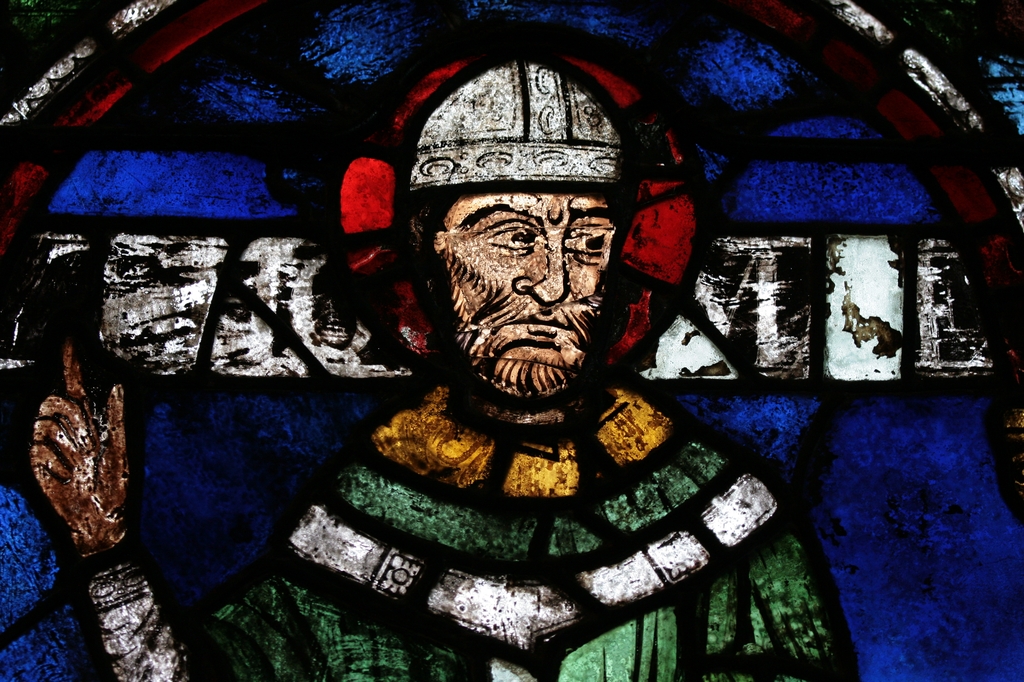Thomas Becket, Archbishop of Canterbury (1162–1170) it is said, particularly liked staying at Otford, which he did several times over the next eight years.
St.Thomas Becket regarded Otford as his favourite residence and he gave his name to the medieval cistern, Becket’s Well. Its water continues to feed the Darent to this day. In his book A perambulation of Kent (written in 1570 and published in 1576) William Lambarde wrote:
“As he walked on a time in the olde Parke, busie at his prayers, he was hindered in devotion by the sweete note and melodie of a nightingale. Therefore he enjoyned that from henceforth no byrde of that kynde shoulde be so bolde as to sing thereabouts. He strikes his staffe into the dry groundne, immediately water appeared.”
However this interdiction of nightingales seems to have been time-limited. In her memoire written when she was 93, Mrs Emery wrote: “The Vicar had a housekeeper, but after Mrs. Lutyens [wife of Rev EW Lutyens] came, she wouldn’t stay on. I must tell you that one evening before she left [c1907] she said she wanted to take me for a walk. She went up Kiln Hill (Now Twitton Road) as far as Telston Lane which was then a rough cart track with elm trees along the side. When we got there she said, ‘Now listen.’ And the nightingales were absolutely beautiful. (Extract from memoires courtesy of Rod Shelton)
The Constitutions of Clarendon were a set of legislative procedures passed by Henry II of England in 1164 and represent an attempt to restrict ecclesiastical privileges and curb the power of the Church courts and the extent of papal authority in England. Thomas Becket resisted the Constitutions, especially the clause concerning “criminous clerks”. As a result, Henry put Becket up for trial at Northampton. The bishops were in agreement over the articles until the Pope disapproved and then Becket repudiated his arguments.
Lambarde reports that the Bishops of London and Chichester tried to make peace. They said that they had found out a way for peace: and when the Archbishop [Thomas] had required, under what forme? They answered: There is a question of money betweene you and the King: If therefore you will assigne unto the King, your two manors, Otford and Wingham in the name of a pledge, we beleeve that he being therewith pacified, will not only resigne you the Manors againe and forgive you the money, but also a great defale the sooner receive you to his favour. To this the Archbishop replied, The Manor of Hethe was sometime belonging to the Church of Canterburie (as I have hearde) which the King now hoth in demeane: And albeit that the only challenge of the thing if sufficient cause to have it restored to the Church of Canterbury, yet I do not looke that it will be done in these times: Neverthelesse, rather than I will renounce the right, which the Church of Canterbury is saide to have in that Manor, either for the appeasing of any trouble whatsoever, or for recoveries of the Kings favour, I will offer this head of mine (and touched it) to any hazarde or daunger, whatsoever it be: The Bishops being angrie with this, went out from him, and tolde the King of all, and his indignation was sore kindled with it.
Becket was murdered in Canterbury Cathedral on 29th December 1170.
The Well is part of the Otford Palace Scheduled Monument. There is a comprehensive description in The Northern Antiquarian website and a video on the Otford Palace website tells the Story of Becket’s Well
Lambarde, W. (1576) A perambulation of Kent containing the description hystorie, and customes of that shire. Miami: HardPress (2010). ISBN 978129031304
